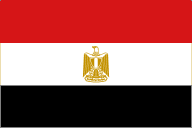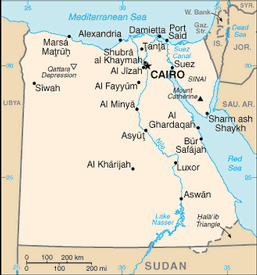| Location and Size | Credit and Collections |
| Government | Risk Assessment |
| Legal System | Business Climate |
| People | Business Protocol |
| Economy | |
| Comparative Indicators |
12345
Location and Size
The Arab Republic of Egypt is located in Northern Africa. It is bordered by the Mediterranean Sea to the North, the Red Sea and the Gaza Strip to the East, Sudan to the South, and Libya to the West. Its land area extends into the Asian Sinai Peninsula. With a total land area of 1,001,450 sq. km., it is about the combined size of Texas and California.
Government
Egypt is a Republic.
Executive Branch: Chief of State: President Abdelfattah El-Sisi, and Head of Government: Prime Minister Mostafa Madbouly
Legislative Branch: House of Representatives: 596 seats of which 448 members are elected by popular vote; additional seats are appointed by President.
Judicial Branch: Supreme Constitutional Court
Legal System
Egypt has a mixed legal system based on Napoleonic civil law and Islamic Shariah religious law. It has accepted compulsory International Court of Justice (ICJ) jurisdiction with reservations.
People
- Population: 109,546,720 (2023 est.)
- Population growth rate: 1.59% (2023)
- Languages: Arabic (official), English, and French widely understood by educated classes
- Literacy: 99.1 % (2023 est.)
- Ethnic Make-up: Egyptian 99.7%, other 0.3%
- Religions: Muslim (predominantly Sunni) 90%, Christian (majority Coptic Orthodox, other Christians include Armenian Apostolic, Catholic, Maronite, Orthodox, and Anglican) 10%
Economy
With the support of the International Monetary Fund, Egypt embarked on an ambitious economic reform over the past few years. Among the significant measures, the liberalization of the Egyptian pound on the foreign exchange market was accompanied by a depreciation of 50% against the US dollar, and led to an increase in foreign exchange reserves of 80% during the year, mainly due to the influx of capital.
Leading Markets (2023): US 7.6%, Italy 7.3%, India 6.1%, Spain 5.4%, Saudi Arabia 5.4%, France 4.7%, Libya 4%
Leading Exports – Commodities: crude oil and petroleum products, cotton, textiles, metal products, chemicals, processed food
Leading Suppliers (2023): US 11.8%, China 10.4%, Germany 6.5%, Italy 6.4%, Saudi Arabia 4.1%
Leading Imports – Commodities: machinery and equipment, foodstuffs, chemicals, wood products, fuels
Top Industries: Textiles, food processing, tourism, chemicals, pharmaceuticals, hydrocarbons, construction, cement, metals, light manufactures
Top Agricultural Products: Cotton, rice, corn, wheat, beans, fruits, vegetables, cattle, water buffalo, sheep, goats
Comparative Economic Indicators – 2023
| Egypt | Israel | Jordan | Libya | Saudi Arabia | Sudan | |
| Population (millions)* | 95.69 | 7.5 | 6.5 | 6.6 | 26.1 | 45.0 |
| Population growth rate (%)* | 2.0 | 1.6 | 1.0 | 2.1 | 1.5 | 2.5 |
|
Age Structure (%)
(15 to 64 years old) |
62.8 | 82.2 | 59.9 | 62.7 | 67.6 | 55.2 |
|
Age Structure (%)
(65+ years old) |
4.5 | 10.1 | 4.8 | 4.6 | 3.0 | 2.7 |
| Literacy (%) | 73.8 | 97.1 | 89.9 | 82.6 | 78.8 | 61.1 |
| Unemployment rate (%) | 12.2 | 6.7 | 12.5 | 30.0 | 10.8 | 18.7 |
| Inflation (%) | 11.1 | 2.7 | 5.0 | 2.5 | 5.4 | 13.1 |
| Population below poverty line (%) | 27.8 | 23.6 | 34.5 | unknown | unknown | 40.0 |
| GDP** (USD billion) | 336.3 | 219.4 | 34.5 | 90.6 | 622.0 | 100.0 |
| GDP real growth rate (%) | 4.3 | 4.6 | 3.1 | 4.2 | 3.7 | 5.1 |
| GDP per capita** (USD) | 3,514.0 | 29,800.0 | 5,400.0 | 14,000.0 | 24,200.0 | 2,300.0 |
| Public debt (% of GDP) | 79.9 | 74.5 | 63.2 | 3.3 | 17.1 | 92.6 |
| Industrial production growth rate (%) | 23.5 | 55.8 | 7.3 | 46.3 | 237.9 | 10.3 |
| Exports (USD billions) | 53.0 | 57.9 | 13.0 | 24.7 | 88.4 | 9.2 |
| Imports (USD billions) | 21.95 | 5.1 | 1.0 | 1.7 | 5.1 | 3.7 |
| Reserves of foreign exchange and gold (USD billions) | 17.68 | 3.6 | 0.7 | 1.2 | 3.7 | 2.7 |
| Currency | Pound EGP |
New Shekel ILS |
Dinar JOD |
Dinar LYD |
Riyal SAR |
Pound SDG |
| Exchange rates (per USD) 10/23/2023 | 286.16 | 0/89 | 6.55 | 4.19 | 104.31 | 0.89 |
| Exchange rates (per EUR) 10/23/2023 | 323.08 | n/a | 7.40 | 4.73 | 117.78 | n/a |
Economic Data from CIA World Factbook
Credit and Collections
Dispute Resolution
The Egyptian judicial system functions extremely slowly, and cases can remain in the system for several years. The U.S. Embassy recommends that U.S. companies include clauses specifying binding international arbitration of disputes in their commercial agreements.
Arbitral awards are made in the original currency of the transaction, via the competent court in Egypt, usually the Cairo Court of Appeals. A special order is required to challenge an arbitration award in an Egyptian court. To enforce judgments of foreign courts in Egypt, the party seeking to enforce the judgment must obtain an exequatur. To apply for an exequatur, the normal procedures for initiating a lawsuit in Egypt must be satisfied. Moreover, several other conditions must be satisfied, including ensuring reciprocity between the Egyptian and foreign country’s courts and verifying the competence of the court rendering the judgment.
Risk Assessment
Coface Country Rating: B – Uncertain economic and financial outlook. Political context could suffer strong tensions. Business climate can present potential shortcomings.
Coface Business Climate Rating: B – To boost investment in the sector, the government is preparing a new contract model based on a more attractive compensation package for oil companies. Growth in the hydrocarbon sector has benefited the manufacturing sector, which has been improving in 2023.
Political and economic uncertainties and an occasionally difficult business environment can affect corporate payment behavior. Corporate default probability is appreciable.
Business Climate
Economic Freedom: Egypt’s economic freedom score is 49.6, making its economy the 151 freest in the 2023 Index of Economic Freedom. Egypt is ranked 11th out of 14 countries in the Middle East/North Africa region, and its overall score is just below the world and regional averages.
Market Access: Egypt’s trade regulations impose distinct barriers on foreigners. Foreigners may function as commercial agents, but are prohibited from acting as importers for trading purposes. A foreign company wishing to import for trading purpose must do so through an Egyptian importer.
A number of non-tariff barriers or bans continue in force to protect local producers. Mandatory quality-control standards make importing certain products into the Egyptian market difficult. Over 130 categories of imports are still subject to mandatory quality-control inspections, including foodstuffs, appliances, electrical products, and auto parts.
Regulatory System: The Egyptian government has made considerable effort to improve the transparency of government policy. The process has proven difficult and has faced strong resistance from entrenched bureaucratic interests. Significant obstacles continue to hinder private sector investment, including the often-arbitrary imposition of bureaucratic impediments and the length of time needed to resolve them.
Exchange Control: Egyptian law allows individuals and businesses to conduct all normal foreign exchange transactions, including establishing foreign exchange accounts and transferring foreign exchange in and out of Egypt. Authorized banks may provide the full range of foreign exchange transactions, including accepting deposits, executing transfers, and opening letters of credit. Foreign currency is available at banks and foreign exchange bureaus.
Business Protocol
Islam is practiced by the majority of Egyptians and governs their personal, political, economic and legal lives. Egyptians prefer to do business with those they know and respect, therefore expect to spend time cultivating a personal relationship before business is conducted. Who you know is more important than what you know, so it is important to network and develop a number of contacts.
Expect to be offered coffee or tea whenever you meet someone, as this demonstrates hospitality. Even if you do not take a sip, always accept the beverage. Declining the offer is viewed as rejecting the person.
You should demonstrate deference to the most senior person in the group, who will also be their spokesperson. This is a country where hierarchy and rank are very important.
**********
Subscribe to the Credit-to-Cash Advisor
Monthly e-Newsletter — It’s Free
This information is provided by ABC-Amega Inc. Providing international receivable management and debt collection services for exporters to more than 200 countries. For further information, contact [email protected].

